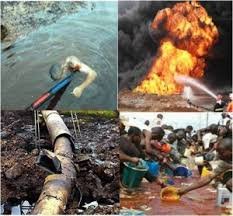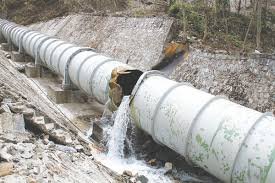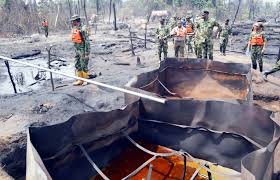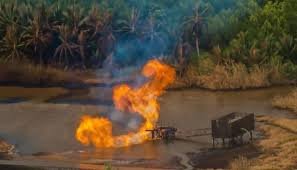
LAGOS, Nigeria – Nigeria’s oil wealth — once the symbol of national pride and prosperity — has turned into a pipeline of plunder. Every stolen barrel represents not just crude siphoned from pipelines, but futures stolen from citizens. In this report, Korede Abdullah exposes how a billion-dollar oil theft industry continues to bleed Africa’s largest crude producer, corrode its governance, and deepen the nation’s poverty trap.

A National Scandal of Unthinkable Scale
Few crises reveal Nigeria’s governance collapse more starkly than its crude oil theft epidemic. According to the Nigerian Extractive Industries Transparency Initiative (NEITI), the country lost 13.5 million barrels of crude oil valued at $3.3 billion (₦5 trillion) between 2023 and 2024 alone.
At the 2025 Association of Energy Correspondents of Nigeria (NAEC) conference in Lagos, NEITI’s Executive Secretary, Dr. Ogbonnaya Orji, described the losses as “a hemorrhage of national wealth and a betrayal of the Nigerian people.”
“This is not just theft,” Orji warned. “It is systemic failure — an open wound that undermines every effort at national recovery.”
The staggering losses, NEITI argued, could have built thousands of hospitals, schools, and power projects — or funded Nigeria’s entire immunization programme for a decade.
Trillions Lost, Transparency Missing
Nigeria earned $23.04 billion in 2021 and $23.05 billion in 2022 from the oil and gas sector. Yet, NEITI’s audit revealed that ₦1.5 trillion remained unremitted to the Federation Account by companies and agencies.
“These funds could have built energy infrastructure and funded healthcare for millions,” Orji lamented. “This is not just theft — its opacity, weak data systems, and lack of accountability. Transparency is not optional; it’s essential for Nigeria’s survival in the global energy landscape.”
Industrial-Scale Looting in Plain Sight
The Nigerian Upstream Petroleum Regulatory Commission (NUPRC) recently disputed reports that 69 million barrels of crude, worth $5.61 billion, went missing between 2021 and mid-2025 — but conceded that theft remains a problem.
It claimed that daily losses have dropped by 90%, from 102,900 barrels in 2021 to 9,600 barrels in September 2025, due to tighter monitoring and military collaboration.
Yet analysts remain skeptical. NUPRC’s own data show that between 2002 and 2025, Nigeria lost 353 million barrels of crude — equivalent to $25.7 billion (₦39.3 trillion), roughly 72% of the 2025 national budget at $73 per barrel.
From 2009 to 2020, NEITI audits recorded an additional $46 billion lost through vandalism, crude diversion, and poor metering. “The scale of plunder is industrial,” Orji admitted. “Local and foreign networks operate vessels right under the nose of security agencies.”

The Economics of National Betrayal
For economists, the theft is a fiscal catastrophe. Dr. Tosin Yusuf, a Lagos-based economist, told Africa Health Report that the scale is “a national tragedy.”
“$3.3 billion is over ₦5 trillion — enough to build 10,000 kilometres of roads, 15 teaching hospitals, and modernize all federal universities,” he explained.
He warned that the damage goes beyond lost revenue: “It widens our deficit, depletes foreign reserves, weakens the naira, and forces reckless borrowing. This is not just theft — it is sabotage of Nigeria’s future.”
Governance Failure: The Hidden Engine of Theft
Oil theft, experts argue, thrives not only because of vandals but because of collusion at the highest levels.
Between 2017 and 2022, NEITI recorded 7,143 pipeline vandalism cases, resulting in the theft of 208.63 million barrels, valued at $12.74 billion. During the same period, Nigeria spent ₦471.5 billion repairing pipelines, according to Obiageli Onuorah, NEITI’s Deputy Director of Communications.
“The recurring cycle of loss and repair reflects entrenched corruption,” said energy lawyer Tayo Oloruntola. “Security agencies often look away. Oil theft is not a crime of poverty; it’s a crime of privilege — enabled by political interests and sustained by institutional failure.”
NNPCL Under Fire for Secrecy and Waste
Oloruntola described the Nigerian National Petroleum Company Limited (NNPCL) as “a wasteful institution, ineptly managed.”
“Billions vanish annually without proper accountability. The company operates like a political agency, not a commercial enterprise,” he said.
He criticized the government’s reliance on private contractors for pipeline protection. “Such sensitive operations should never be handed to non-state actors. It’s a dangerous national risk,” he warned.
“Transparency must begin with leadership,” Oloruntola added. “NNPCL must publish audited financials and stop functioning as a political cash cow.”

Security Forces’ Victories or Cosmetic Fixes?
The Nigerian Navy recently intercepted a fibre boat carrying 4,000 litres of suspected Automotive Gas Oil (AGO) near Atlas Cove, Lagos.
Executive Officer of NNS BEECROFT, Captain Idongesit Udoessien,said the mission aimed to “eliminate all forms of economic sabotage.”
But environmentalist and the Executive Director of the Health of Mother Earth Foundation (HOMEF), Nnimmo Bassey dismissed such wins as “bandages on a festering wound.”
“Illegal refineries deactivated are often soon reinstalled,” he said. “The real thieves — those operating ocean-going vessels — are never prosecuted. These ships can’t move undetected. Why are they never caught?”
Environmental Neglect and Accountability Crisis
Bassey also condemned NNPCL’s negligence over the Ororo-1 oil well inferno in Ondo State, which has burned and spilled crude for five years.
“Security forces guard the site while oil burns into the ocean,” he said. “The environmental damage dwarfs the so-called recovered barrels.”
“As long as NNPCL sits within regulatory architecture and prioritizes revenue over responsibility, nothing will change,” he concluded grimly.

A Continental Security Threat
At the 12th Annual African Security Symposium in Addis Ababa, NSCDC Commandant-General, Dr. Ahmed Abubakar Audi warned that oil theft and illegal mining are now continental threats.
“These crimes deplete national wealth, fuel conflict, and destabilize the region,” he said. Represented by ACG Muktar Lawal, Audi noted that the Corps had achieved “significant successes” dismantling refineries through intelligence-led operations.
Still, experts argue such victories lack political coordination and sustainability.
Technology and the Politics of Prevention
NEITI and industry experts have called for digital surveillance, IoT sensors, satellite tracking, and blockchain metering to monitor pipelines.
“Data builds trust, trust drives investment, and investment generates impact,” said Orji.
But Oloruntola warned: “You can have the best drones, but if those behind the theft are politically protected, the system collapses. The Petroleum Industry Act must have real consequences — regardless of status or connection.”

Beyond Cosmetic Fixes: The Urgency of Reform
Across boardrooms, villages, and ministries, one truth unites all voices: Nigeria cannot continue losing billions while borrowing to survive.
Economist, Dr. Yusuf called for transparent audits and open data. Nnimmo Bassey demanded ecological justice. Tayo Oloruntola urged corporate accountability.
“Until Nigeria confronts oil theft as treason against the state,” Oloruntola warned, “the country will remain hostage to its own corruption.”
The message is clear: Nigeria’s black gold has turned into a curse. Only radical transparency, firm justice, and ecological responsibility can redeem the nation’s future — and end the decades-long bleeding of its wealth.




